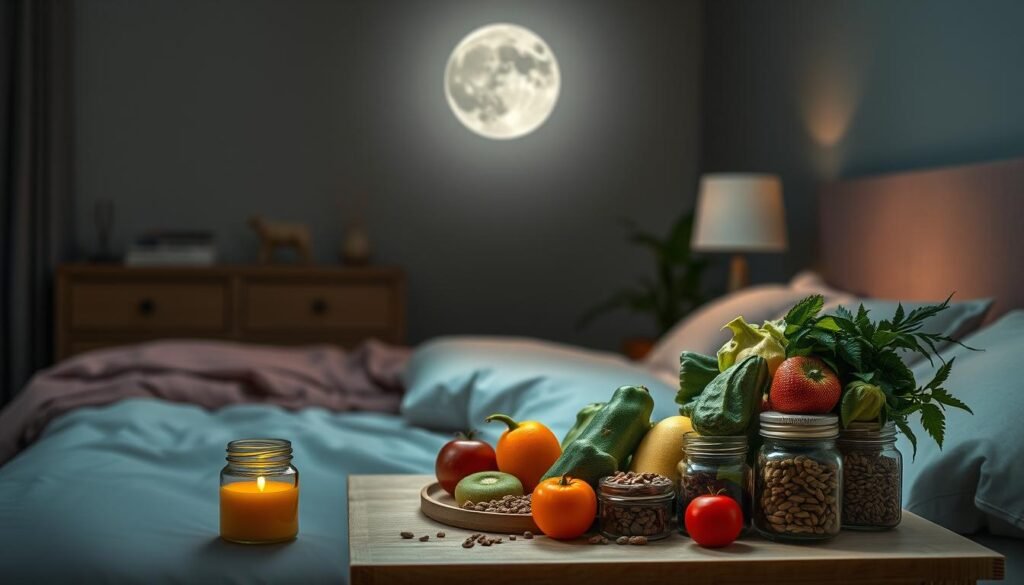Zinc is very important for our bodies. It’s the second most common trace metal in us. Still, many people don’t know how important it is for our sleep. Researchers are looking more into how zinc affects our sleep. This is because more people are having trouble sleeping these days. Does zinc lead to insomnia? Let’s explore how zinc can cause sleep problems and its overall impact on our health.
Key Takeaways
- Zinc is essential for enzyme function and overall health.
- Sleep disturbances can be linked to zinc deficiency.
- Sleep quality may improve with adequate zinc levels.
- Short sleepers often exhibit zinc deficiency.
- Zinc supplementation is beneficial for various populations.
Introduction to Zinc and Sleep
Zinc is key for our health, taking part in immune function and making proteins. It’s now seen as important for sleep quality too. Studies show that taking extra zinc can help people sleep better, especially if they usually have trouble with it.
In one study, ICU nurses who didn’t sleep well had low zinc levels. When they took zinc supplements, their sleep improved. This was better than those who took a placebo. This highlights how important zinc is for good sleep.
It’s critical to eat enough zinc, as not having enough can cause sleep problems. A UK survey showed that 79% of people had insomnia for more than two years. This might be due to not getting enough nutrients like zinc. People sleeping less often had less zinc in their diets, linking zinc and sleep length.
Zinc helps keep our internal clocks on track, aiding in quality sleep. It mainly improves slow-wave sleep. This phase is essential for body repair and memory.
You can get zinc from shellfish, beef, pork, whole grains, nuts, seeds, and beans. But, plant-based zinc sources need more intake for vegans or vegetarians because they’re harder to absorb. Bad eating habits can lead to low zinc, causing taste issues and getting sick more often.
Knowing how zinc affects sleep can lead to better sleep solutions. More studies could show how to use supplements for sleep improvement. For more details, check out the study on zinc supplementation here.
The Importance of Sleep for Overall Health
Sleep is very important for our health and well-being. Studies show that sleep does more than just rest our bodies. It’s key for our immune system, helps us remember things better, and keeps our metabolism in check.
There are different kinds of sleep, like NREM and REM sleep. NREM sleep restores our body, while REM sleep helps with our feelings and thinking. Not sleeping enough can lead to health problems like heart disease and mental health issues.
About 10–30% of adults have trouble sleeping. Bad sleep habits, stress, and certain meds can make it worse. If you can’t sleep well, it might start affecting your health badly over time.
To sleep better, try to keep a regular bedtime, make your bedroom comfortable, and avoid caffeine before bed. Paying attention to good sleep is crucial. If we don’t sleep enough, it can hurt our health in the long run.
What is Zinc?
Zinc is a vital trace element important for our health. It plays a key role in many body processes. These include DNA synthesis and boosting the immune system. This contributes to our overall well-being.
Zinc has antioxidant properties that protect our cells. It helps with sleep by working with brain chemicals. Adequate zinc levels improve sleep quality, especially REM sleep.
Kids with sleep problems often have low zinc levels. Lack of zinc can disturb sleep. Adults should not take more than 40 milligrams of zinc daily. Oysters are very rich in zinc, offering 291% of the daily value in just three ounces.
Zinc supplements can help people fall asleep faster and improve sleep quality. They affect brain chemicals that help us relax. Studies show zinc shows promise for sleep issues. But we must use the right dose to avoid side effects.
How Zinc Affects the Body
Zinc is crucial for our bodies, supporting many processes. It helps with metabolism and boosts the immune system. Without enough zinc, we may face health problems like weak immunity and skin issues, and brain function could suffer too.
Studies suggest that zinc can affect how well we sleep. People in a study who slept 7 to 9 hours had higher zinc levels. This shows getting enough zinc can help with good sleep.
Kids with sleep problems often don’t have enough zinc. This shortage can make it hard to sleep well. Zinc is important for the brain chemicals that help us sleep. Having enough zinc means serotonin and melatonin can do their jobs, leading to better sleep.
To illustrate the differences in dietary zinc sources and their zinc content, consider the following table:
| Food Source | Zinc Content (mg per 100 grams) |
|---|---|
| Oysters | Over 75 mg |
| Pumpkin Seeds | 7 mg |
| Beef | 5 mg |
| Almonds | 2-4 mg |
| Brazil Nuts | 2-4 mg |
| Cashews | 2-4 mg |
Eating foods high in zinc can boost your zinc levels. This might help with problems caused by not having enough zinc. Also, good sleep habits, a balanced diet, and exercise are key. Paying attention to zinc in your diet can improve sleep and well-being.
The Connection Between Zinc and Sleep Quality
A 2017 study in Biological Trace Element Research found a link between zinc and sleep. Children with sleep problems had lower zinc levels than those who slept well. This suggests that not having enough zinc might affect sleep quality.
Zinc helps us fall asleep faster and sleep better. It works with the brain’s signals, making it easier to sleep. Supplementation can lead to better sleep onset, more restful sleep, and improved sleep quality.
Zinc also impacts the pineal gland, which makes the sleep hormone melatonin. Good zinc levels can extend REM sleep, important for processing memories and emotions. People with more zinc tend to sleep 7 to 9 hours, enjoying healthier sleep patterns.
However, too much zinc can harm sleep and cause other health issues. The best amount of zinc for sleep is still unknown, as it depends on each person.
In conclusion, zinc might be a key factor in better sleep, especially for those with sleep disturbances. Understanding how zinc affects sleep could lead to new ways to help people sleep better.
| Study Focus | Findings |
|---|---|
| 2017 Study on Children | Lower serum zinc levels linked to sleep disorders |
| Zinc Supplementation Effects | Improved sleep onset latency and efficiency |
| Zinc Interaction with Neurotransmitters | Promotes calmness and aids sleep induction |
| Pineal Gland Regulation | Aids in melatonin production and sleep-wake cycles |
| Optimal Dosage | Not yet clearly defined; varies by individual |
Can Zinc Cause Insomnia?
Zinc affects our sleep in big ways. People who don’t get enough zinc may find it hard to sleep well. So, knowing how zinc and sleep relate is key for anyone who has trouble sleeping.
Zinc Deficiency and Sleep Disturbances
Studies link low zinc to bad sleep. If you sleep less than seven hours, your zinc might be low. For example, those who lack zinc tend to sleep less. This issue is common in older people and women.
In China, kids with less zinc in their blood often sleep poorly and not enough. It shows how important zinc is for a good night’s sleep.
The Role of Zinc in Sleep Regulation
Zinc helps our bodies in many ways, including sleep. It works with serotonin to make melatonin, which controls our sleep cycles. Good sleep is vital for our health. So, learning how zinc affects sleep can help with insomnia.
Taking zinc has improved sleep for many people. This means fixing a zinc shortage might solve some sleep problems.

For more information, read this interesting article on zinc and sleep disorders.
The Impact of Zinc Supplementation on Sleep
Zinc can greatly improve sleep quality for many people. Research shows that having enough zinc helps with better sleep. This is because zinc plays a big part in how our brain chemicals work and our sleep patterns.
One important study found that kids who didn’t sleep well had less zinc. This suggests a strong link between not having enough zinc and trouble sleeping. Zinc helps keep our brain chemicals in balance, which is key for good sleep.
More studies show that zinc can help you fall asleep faster and sleep better. A review of 445 studies, narrowed to eight, showed zinc’s positive effects. The zinc was taken in doses from 10 to 73.3 mg daily.
Some plus points of zinc are:
- It helps balance brain chemicals like GABA and glutamate
- It can make REM sleep last longer
- It may decrease sleep apnea symptoms when used with antioxidants
However, too much zinc can cause problems, like stomach issues and sleep trouble. We need more research to fully understand how zinc affects sleep and find the best dosage.
Knowing how zinc supplementation impacts sleep can help people choose supplements wisely. This can improve their health overall.
Dietary Sources of Zinc
Zinc is essential for our body, affecting immune function to sleep quality. It’s important to have enough zinc in your diet to stay healthy. Many foods naturally contain zinc, so a balanced diet can provide what we need. It’s especially key to know these sources if you’re thinking about taking zinc supplements.
Natural Sources of Zinc
Zinc comes from a variety of foods, including animal and plant sources. Eating these foods can help you get enough zinc. You can get zinc from:
- Meat: Beef, lamb, and pork offer rich amounts of zinc.
- Seafood: Oysters have a lot of zinc, and so do crab and lobster.
- Dairy: Foods like milk, cheese, and yogurt are good for zinc.
- Legumes: Beans, lentils, and chickpeas are great if you don’t eat meat.
- Nuts and seeds: Pumpkin seeds, cashews, and hemp seeds have zinc and healthy fats.
If you prefer not to eat meat, plant-based foods can also give you zinc. But, they might have less zinc than animal products.
Zinc Supplements: What to Know
Some people might not get all the zinc they need from food. That’s when zinc supplements can help. They can make sure you have enough zinc, which is good for your sleep and health. But, taking too much can cause problems like zinc toxicity.
Before you think about supplements, here’s what to keep in mind:
- Always talk to a doctor before starting supplements.
- It helps to know how much zinc you should be getting depending on your age and sex.
- Watch out for signs that you have too little or too much zinc. Both can affect your health.

Mineral Imbalance and Sleep Disorders
Nutritional deficiencies can affect how well you sleep. It’s key to get enough zinc, magnesium, and calcium for good sleep. An imbalance in minerals can lead to sleep problems. You could end up with insomnia or restless legs syndrome.
How Nutritional Deficiencies Impact Sleep
Many people, between 14% and 40%, have sleep problems. Studies show that having enough iron, zinc, and magnesium can help you sleep longer. But, lower levels of copper and vitamin B12 might make your sleep worse.
Our brains use certain chemicals to control sleep. Zinc or iron supplements can help babies sleep more. If your body has a mineral imbalance, it might be harder to sleep well. This could lead to tiredness and other health issues.
Checking your mineral levels is important. If they’re off, you could face other health problems, not just bad sleep. A test called Hair Tissue Mineral Analysis can spot what’s wrong. It helps doctors fix your diet to get your minerals back in balance.
| Mineral | Impact on Sleep | Sources |
|---|---|---|
| Zinc | Reduces sleep latency, increases sleep duration | Oysters, red meat, poultry, nuts, beans |
| Magnesium | Enhances sleep quality, reduces insomnia | Dark chocolate, leafy greens, legumes, whole grains |
| Calcium | Aids melatonin production, linked to REM sleep | Dairy, almonds, sardines, edamame |
| Iron | Promotes overall sleep duration | Red meat, poultry, lentils, beans |
| Copper | Excessive levels may disrupt sleep | Shellfish, nuts, seeds, whole grains |
To sleep better, fix nutritional deficiencies. Make sure to eat a diet rich in important minerals. This is crucial for handling sleep disorders the right way.
Finding the Right Balance: Micronutrient Intake and Sleep Quality
Getting enough sleep depends on the right balance of micronutrients. In the U.S., more than 37% of adults sleep less than six hours a night. This sleep shortage is linked to a lack of essential nutrients.
People who don’t sleep enough often don’t get enough calcium, magnesium, and vitamin D. This can make sleep problems worse, leading to a hard-to-break cycle. Women with short sleep times usually lack these nutrients, and men often need more vitamin D.

Many folks aren’t getting enough key nutrients for good health and sleep, like magnesium (55%) and calcium (41%). Checking your nutrient intake closely can show where you need to do better.
Eating foods high in important micronutrients can improve how well you sleep. Oysters and pumpkin seeds, for example, are rich in zinc. This can help you relax and fall asleep faster. Sometimes, adding supplements to your diet is a good idea too.
The 2015–2020 Dietary Guidelines suggest eating more potassium, fiber, and vitamins A, D, E, and C. This can help keep your sleep on track, making you healthier and more rested.
Conclusion
Zinc levels and sleep quality are closely linked. Studies show not getting enough zinc can lead to sleep problems. Children with sleep issues often have lower zinc levels, which points to zinc’s importance for sleep.
Taking zinc supplements can help people fall asleep faster and improve sleep quality. It’s vital to get enough zinc for health and well-being. But too much zinc can be harmful, so we must be careful.
While zinc’s benefits are clear, overdoing it can cause health problems. Research into how zinc works with brain chemicals that control sleep is ongoing. This could lead to new ways to help people sleep better.